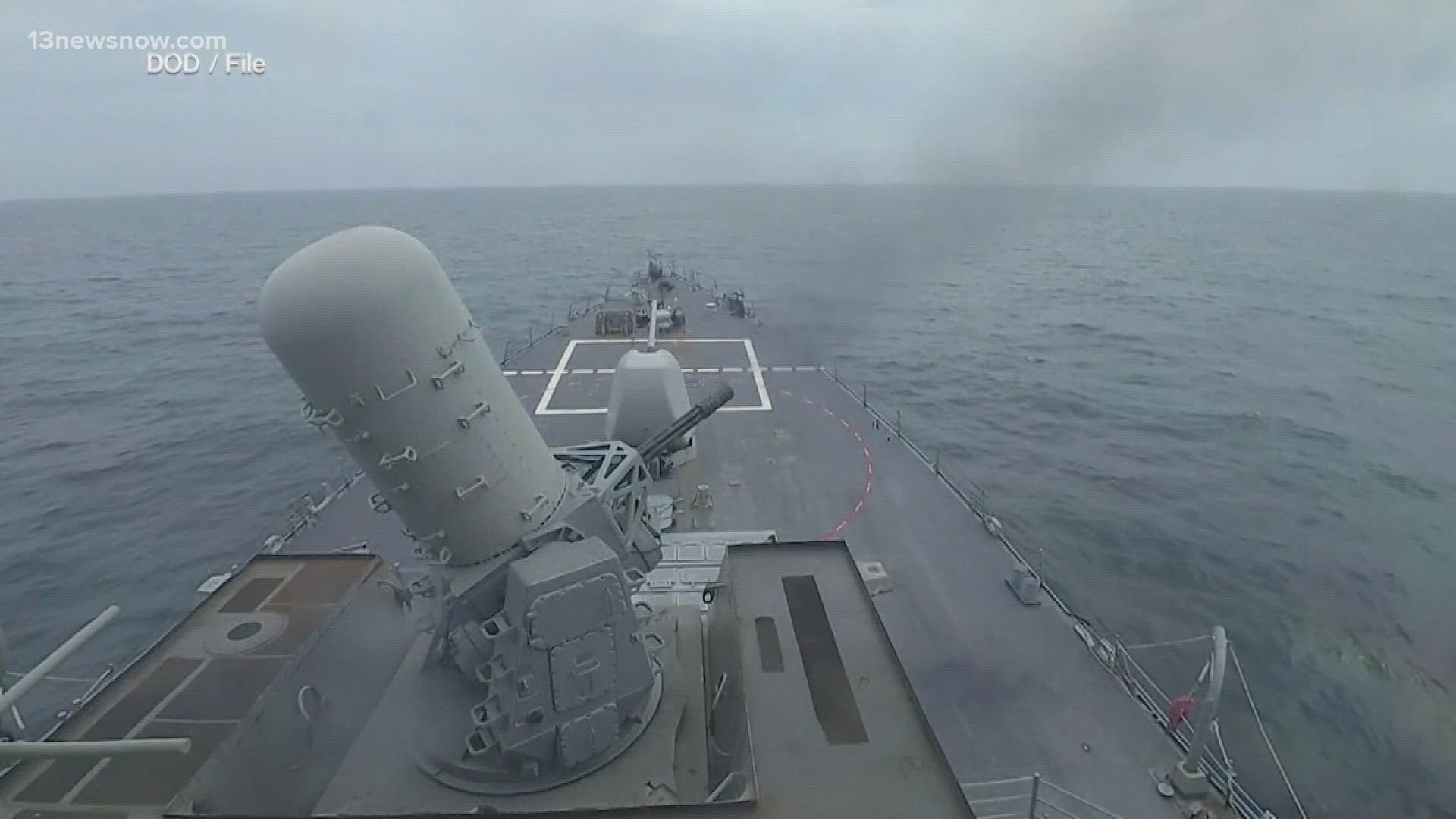NORFOLK, Va. — Sailors onboard two Norfolk-based ships were part of the U.S. retaliation against Iranian-backed militants over the weekend.
The response comes after a drone attack on an American base in Jordan that left three troops dead, as well as multiple missile strikes from Houthi rebels. President Joe Biden promised the U.S. would respond forcefully.
RELATED: US, Britain begin new strikes on Yemen's Houthis, retaliating for attacks by Iran-backed militants
A new video posted by U.S. Central Command shows supporting strikes from USS Eisenhower and USS Gravely against Iranian-backed Houthi targets.
The Norfolk-based ships focused on Houthi-controlled targets in Yemen including missile launches and control centers used to attack international merchant and U.S. Navy ships.
"There was continued strikes using Tomahawk missiles from the destroyers as well as FA-18 air strikes from the carrier the USS Eisenhower," said Wes Rumbaugh, Fellow with the Center for Strategic and International Studies.
The retaliation comes after relentless attacks from the Iran-backed group. It also comes after a Houthi missile came within one mile of USS Gravely on Tuesday, forcing the ship to use its last line of automated weapons defense, according to Rumbaugh.
"It emphasizes the importance of having many different engagement options. Obviously, the preference is to engage as far away from the ship as possible, but it’s also important to have those layers of defense behind that to allow the ships to defend both themselves and commercial shipping," said Rumbaugh.
Now, U.S. Central Command says alongside other nations in the Red Sea, the strikes hit 36 Houthi targets at 13 locations. Rumbaugh said in terms of cost, the U.S. had to take action.
"The United States cannot afford to sit and play catch with every Houthi missile that gets fired at commercial shipping for an indefinite period of time," he said.
U.S. Central Command said the Iranian-backed Houthi targets included multiple underground storage facilities, command and control, missile systems, UAV storage, radars, and helicopters.
"This is part of attempting to limit the Houthi’s ability to fire missiles back," said Rumbaugh. "Long term, the ability of the Houthis to resupply... that’s a question that sort of brings Iran into the picture."
He said we saw a little bit of Iran's willingness to cooperate.
"To attempt to de-escalate the sort of broader Middle Eastern conflict that's going on in Iraq and Syria and was willing to leave some of their proxies hanging out to dry. So, the question is whether Iran wants to continue allowing the Houthis to escalate the crisis in the Red Sea by providing them with those resources."
Senator Tim Kaine called the ongoing attacks from the Houthis “unacceptable,” saying the continued escalation puts lives at risk.
"Continued escalation puts lives at risk, including U.S. service members, and hurts our supply chains and economy. I’m grateful for the service of Virginia’s servicemembers aboard ships in the Red Sea and thinking of the many families in Hampton Roads who have loved ones deployed. I’ll continue working with my colleagues in Congress and the Administration to ensure our servicemembers in the region are protected and we’re not being pulled into another war in the region," Kaine said in a statement.
Rep. Jen Kiggans (R-Virginia, 2nd District) commended the sailors aboard and their family members back at home for their efforts, saying they are "projecting American strength in the Middle East."
“This includes the sailors of the USS Gravely and the USS Eisenhower who are bravely defending civilian ships and crews in the Red Sea. America’s Navy and our allies are standing between violent Houthi terrorists and the stability of critical international shipping lanes on a daily basis," Kiggans said in a statement.
These strikes followed an air assault in Iraq and Syria on Friday targeting other Iranian-backed militias and the Iranian Revolutionary Guard to retaliate for the drone strike that killed three U.S. troops in Jordan last weekend.
Rumbaugh said as the conflict in the Red Sea continues, Americans will notice an increased cost of global shipping, in terms of increasing the cost of insurance for anyone that's going through the Red Sea.

